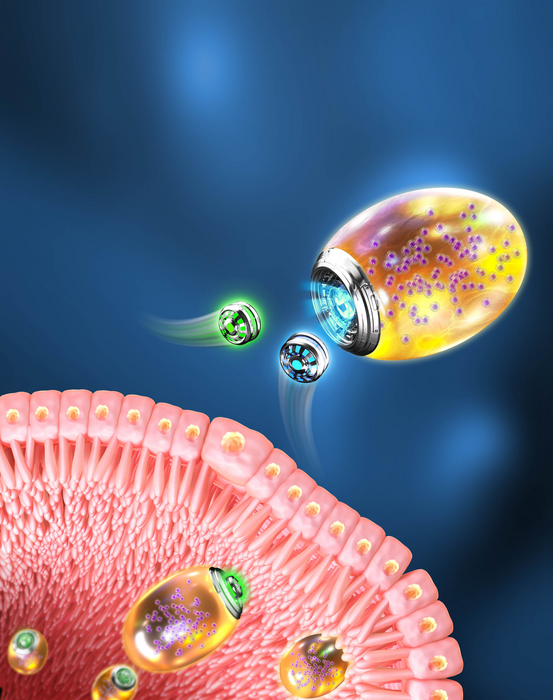Micro/nanorobots with self-propelling and -navigating capabilities have attracted extensive attention in drug delivery and therapy owing to their controllable locomotion in hard-to-reach body tissues.
However, developing self-adaptive micro/nanorobots that can adjust their driving mechanisms across multiple biological barriers to reach distant lesions is still a challenge.
Recently, a research team led by Prof. CAI Lintao from the Shenzhen Institute of Advanced Technology (SIAT) of the Chinese Academy of Sciences has developed a twin-bioengine yeast micro/nanorobot (TBY-robot) with self-propelling and self-adaptive capabilities that can autonomously navigate to inflamed sites to provide gastrointestinal inflammation therapy via enzyme-macrophage switching (EMS).
This study was published in Science Advances on Feb. 22.
The researchers constructed the TBY-robot by asymmetrically immobilizing glucose oxidase and catalase onto the surface of anti-inflammatory nanoparticle-packaged yeast microcapsules. At a homogeneous glucose concentration, the Janus distribution of enzymes can catalyze the decomposition of glucose to generate a local glucose gradient that induces TBY-robot self-propelling motion.
In the presence of an enteral glucose gradient, the oral TBY-robots move toward the glucose gradient to penetrate the intestinal mucus barrier and then cross the intestinal epithelial barrier by microfold cell transcytosis. “We found that TBY-robots effectively penetrated the mucus barrier and notably enhanced their intestinal retention using a dual enzyme-driven engine moving toward the enteral glucose gradient,” said Prof. CAI.
After in situ switching to the macrophage bioengine in Peyer’s patches, the TBY-robots autonomously migrate to inflamed sites of the gastrointestinal tract through chemokine-guided macrophage relay delivery. “Encouragingly, TBY-robots increased drug accumulation at the diseased site by approximately 1000-fold, markedly attenuating inflammation and ameliorating disease pathology in mouse models of colitis and gastric ulcers,” said Prof. CAI.
This twin-bioengine delivery strategy is a sequence-driven process using EMS, with Peyer’s patches as transfer stations. This process can precisely transport therapeutics across multiple biological barriers to distant, deep-seated disease sites.
“The transport route is similar to that of the Express Mail Service, which precisely delivers parcels to a distant destination using different transportation facilities,” said Prof. CAI. These self-adaptive TBY-robots represent a safe and promising strategy for the precision treatment of gastrointestinal inflammation and other inflammatory diseases.
Journal
Science Advances
DOI
10.1126/sciadv.adc8978
Article Title
Twin-bioengine self-adaptive micro/nanorobots using Q1 enzyme actuation and macrophage relay for gastrointestinal inflammation therapy
Article Publication Date
22-Feb-2023

















